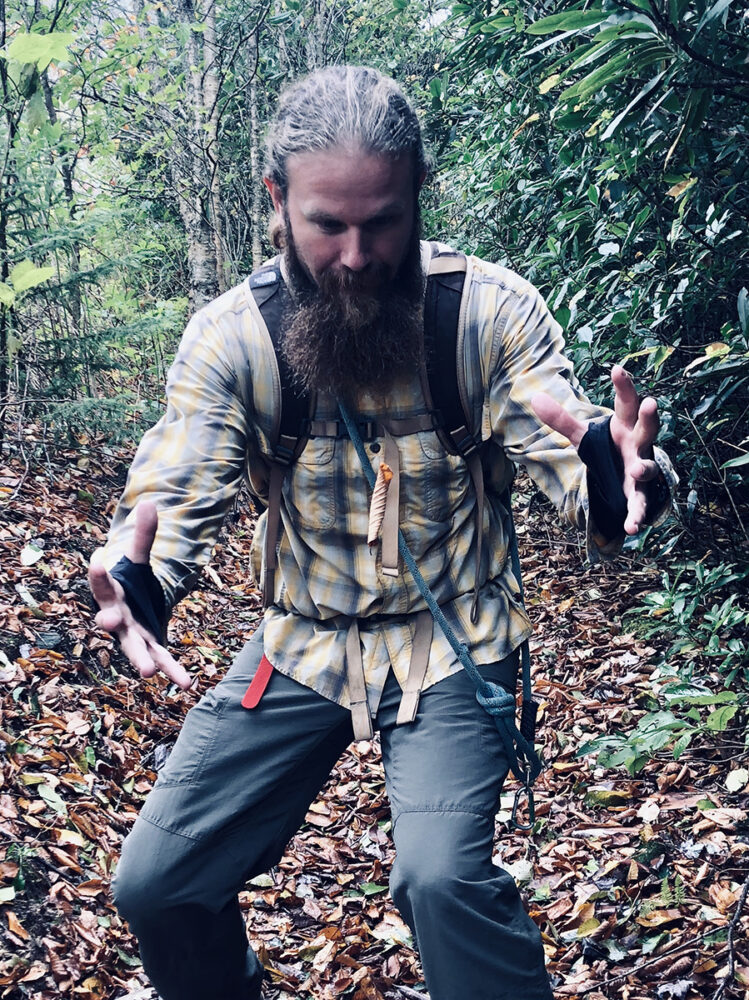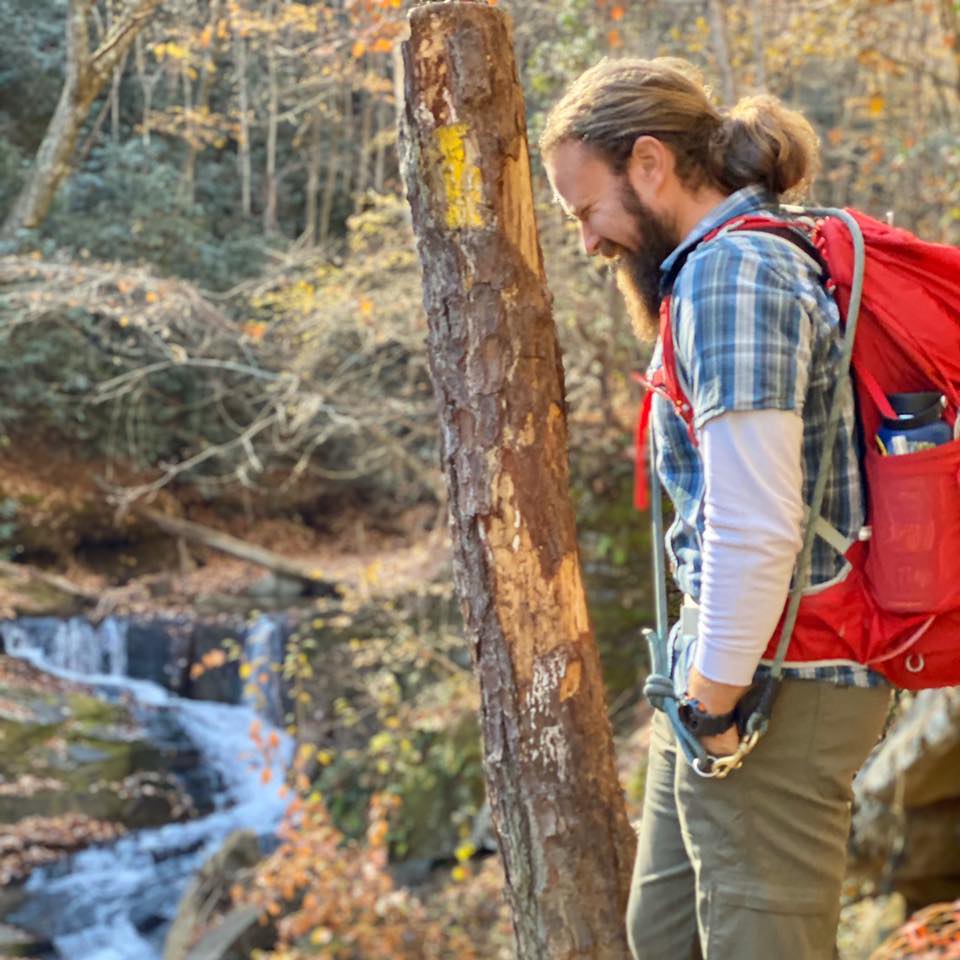We met Matt Nannis last fall at the Outdoors for All conference in Old Fort, NC and we were immediately drawn to his gentle demeanor and genuine desire to help others. Through his nonprofit, PIVOTPoint WNC, Matt and his team have helped numerous individuals become stronger, healthier versions of themselves through transformative outdoor experiences and therapeutic adventures. If you are interested in supporting PIVOTPoint and its amazing therapeutic work, please click here to make a donation.

Can you share with us the mission of PIVOTPoint WNC?
We’re a therapeutic adventure company and our mission is to amplify access to the transformative power of the natural environment. We offer intentional group facilitation to those facing challenges around mental health, behavioral health, and substance use. Simply put, our mission is to get you outside to connect and heal.
What does therapeutic adventure work mean and who benefits?
According to “Adventure therapy: Theory, practice, & research” (Gass, Gillis, & Russell 2012), Adventure Therapy (not your question, I know!) refers to “the prescriptive use of adventure experiences by mental health professionals, often conducted in natural settings that kinesthetically engage clients on cognitive, affective, and behavioral levels.” That’s what we’re talking about here. We’re utilizing the woods and rivers and mountains – mountain biking, rock climbing, hiking, whitewater rafting, paddleboarding – to help our clients identify their core values, and how to behave and interact in alignment with them. And while most of our team is composed of licensed clinicians and social workers, we are not performing traditional therapy on our outings; so, we describe our work as therapeutic adventure (adjective vs noun).
The work we do in the woods is anchored in meaning making, which stems from the individual’s experience. We say things like “have an experience,” and “transformation through relationship.” These are rooted in how each group – how each member of the group – sees themselves and sees the world.
What sets PIVOTPoint WNC apart from other types of outdoor or recovery programs?
Our team. They’re brilliant and can build trust and rapport with our clients at an amazing pace and that trust is the foundation of the therapeutic relationship and the building blocks of the work. There are other elements of our delivery model that set us apart in these field(s) too – we’re the only group around with a comprehensive, structured day outpatient model. It creates endless opportunities for application practice. We set up an environment for our clients to try and fail, then learn from it and try again, all in a real-world setting.
When did you launch PIVOTPoint and why in Western NC?
I started doing this work in 2014 shortly after completing a step-down recovery program here in Asheville. Incorporated with the state as a formal organization in 2017 and reorganized in 2019 as a nonprofit. Why here? Why not? Here’s where I was and where I am. I’m an easily overwhelmed human. I landed in Asheville in September of 2013, I only stuck around because where I landed allowed me to go hiking every Sunday when nothing else at the time made any sense. That always felt significant to me; these trails and rivers felt significant to me, and I wanted to share that.

You are clearly a very kind and generous individual. What keeps you doing this unique work, especially on really challenging days?
We get emails and texts from the parents/guardians of local high school kids who we get to work with through our contract with the county’s Department of Juvenile Justice. I’ll be checking out at Harris Teeter after work and I’ll see the young man at the till that spent a summer with us during our Guard Your Growth resilience-based program. I ask new guides that super cheesy “where do you see yourself in five years” kind of question during interviews and monthly at staff meetings, and if I or PIVOTPoint can be a part of getting them “there,” then we do it. How can I not? The really challenging days are the ones when we get to learn the most – usually about ourselves.
In your experience, is there a specific adventure that facilitates the greatest transformation for most people?
There is no one-stop, go-to in any of this as I’ve experienced it. The work we do in the woods is anchored in meaning making, which stems from the individual’s experience. We say things like “have an experience,” and “transformation through relationship.” These are rooted in how each group – how each member of the group – sees themselves and sees the world. I love the metaphors that rafting brings: that we all gotta contribute and if we can’t prioritize/put our superficial differences aside, we’re gonna hit that rock downriver and go for a swim. Rock climbing’s also a great way to fast-track through conceptualizing trust, collaboration, and discomfort to get right to their experience of them. That’s what we’re aiming for here: theoretical strategies and skill development aren’t practical – we must experience this stuff on a cellular level to incorporate it into our lives.
How can the outdoor community get involved and support PIVOTPoint?
Oh wow, so many ways: we always look for inclement weather gear to outfit our subsidized work within the community. Being in an unpredictable mountain weather system, we’re honored to be able to partner with local indoor gyms and outfitters that help us bring the container we set outside, inside. At the end of the day, half of all of our work is 100% subsidized. That means we rely on donations and funding for the outings themselves, for professional development, and training for our team. We host a handful of formal fundraising events each year and are always interested in corporate sponsors/community partners.
How do you relax when you are not guiding the ship?
I hike with my dog. I go to see local music. I paddleboard an easy section of the river.
Is there a particular mentor in therapeutic medicine, business, or just life that has played a huge role in your trajectory?
I’m a collector of mentors and teachers. I’ve gotten pretty damn good at tripping over my own feet, landing flat on my face, and picking myself back up and – after a mini tantrum or three – moving forward with more data and making more informed decisions about what to do next. I’ve learned a lot from the recovery community here in town; the biggest lesson so far is to stay open enough to realize I can learn from folks outside the recovery community, too. I honestly don’t think too hard on identifying the whys behind my life’s trajectory – that kinda shit keeps me too far out of the moment, out of gratitude.
What are you reading at the moment?
A new friend I met on a work trip just this week handed me ‘The Anatomy of Peace.’ And I have these on my bedside table with a few bookmarks strewn throughout: ‘Being Aware, of Being Aware,’ ‘Harry Tiebout, The Collected Writings,’ and ‘The Infinite Game.’
Last question, tell us one thing we’d be surprised to learn about you?
I’m a sucker for an animated movie.
Learn more about PIVOTPoint WNC at their site: https://pivotpointwnc.org/
Want to read more interviews like this, check out our entire Coffee Talk collection of interviews HERE.
